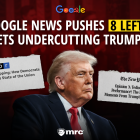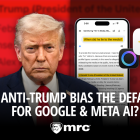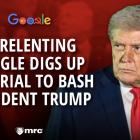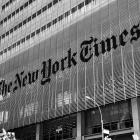TikTok CEO Shou Zi Chew is currently attempting to defend his company at a House Energy and Commerce Committee hearing. But is there anything he can say to assuage Americans’ national security concerns about TikTok?
 MRC Free Speech America asked three experts on national security and U.S.-China relations their thoughts on TikTok and the serious threat it poses to Americans’ data and national security.
MRC Free Speech America asked three experts on national security and U.S.-China relations their thoughts on TikTok and the serious threat it poses to Americans’ data and national security.
Fox News China expert Gordon Chang said that TikTok is untrustworthy and the CEO can’t necessarily guarantee how user data is used by the Communist Chinese government; former member of the Defense Intelligence Community Scott Kieff said that the U.S. should believe China when it reveals that it’s being nefarious; and former Deputy National Security Advisor KT McFarland noted the disturbing ways the Chinese government can use TikTok to influence Americans.
Chang said that even if the TikTok CEO attempts to mitigate concerns, the app has already shown itself to be a bad actor. “TikTok has given so many assurances in the past that it wouldn’t surveil users and it’s violated all of those assurances so they’re entitled to absolutely no credibility,” he said. Chang later added that for him, "there’s nothing that [Chew] could say that would provide an assurance.”
He also referenced the fact that a Beijing company owned by three state entities in China owns a one percent stake in TikTok’s parent company ByteDance. “[Chew] is going to say, as he has in the past, that TikTok would never spy on U.S. companies or users, but that’s not his call,” Chang said. “The 2017 national intelligence law of China articles 7 and 14 require every Chinese entity to spy if demanded.” He explained that although TikTok U.S. is not a Chinese company, its parent company ByteDance would be “obligated under general shareholder principles to follow what its shareholder says.” [Emphasis added.]
Kieff noted that the U.S. should take China seriously. “[TikTok is] very much authentically part of a foreign state that has shown itself and declared itself to use networks like this both to gather [data] and to influence,” he said. “It’s OK to take adversaries at face value when they say they’re acting against you and show they’re acting against you.” [Emphasis added.]
McFarland noted that one of the ways TikTok acts against the U.S. is by collecting alarming amounts of user data. She said that by downloading the app, “you’re letting the Chinese Communist Party into every aspect of your life.” She explained "that doesn’t just mean that they have access to your emails. They have access to your camera, for example, when you think it’s turned off. They have access to your address book.”
All three experts also stressed that TikTok can and is being used as a powerful tool to shape American thought. Kieff said TikTok is a problem because it is used “to sow dissension and disintegration of social, political and economic fabric.” Chang gave examples of the types of videos the app recommends. “We know that it pushes critical race theory, it glorifies drug use,” he said. “These are narratives that Beijing finds to weaken American society, and these are things you don’t see on Douyin, which is the sister site in China.”
McFarland noted that TikTok’s influence can become “election interference on steroids.” She said that the Chinese Communist Party realizes “the great soft underbelly and great vulnerability of Democracy,” which is that it’s entirely based on what people think and the candidates they choose to elect.
“[T]hey’re feeding you information that destroys your confidence in the efficacy of democracy and destroys your confidence in the candidate that you might like, or builds up your confidence in the Chinese Communist Party,” she said.
Conservatives are under attack. Contact Big Tech and demand that they be held to account to mirror the First Amendment and monitor Chinese propaganda while providing transparency, clarity on “hate speech” and equal footing for conservatives. If you have been censored, contact us using CensorTrack’s contact form, and help us hold Big Tech accountable.









